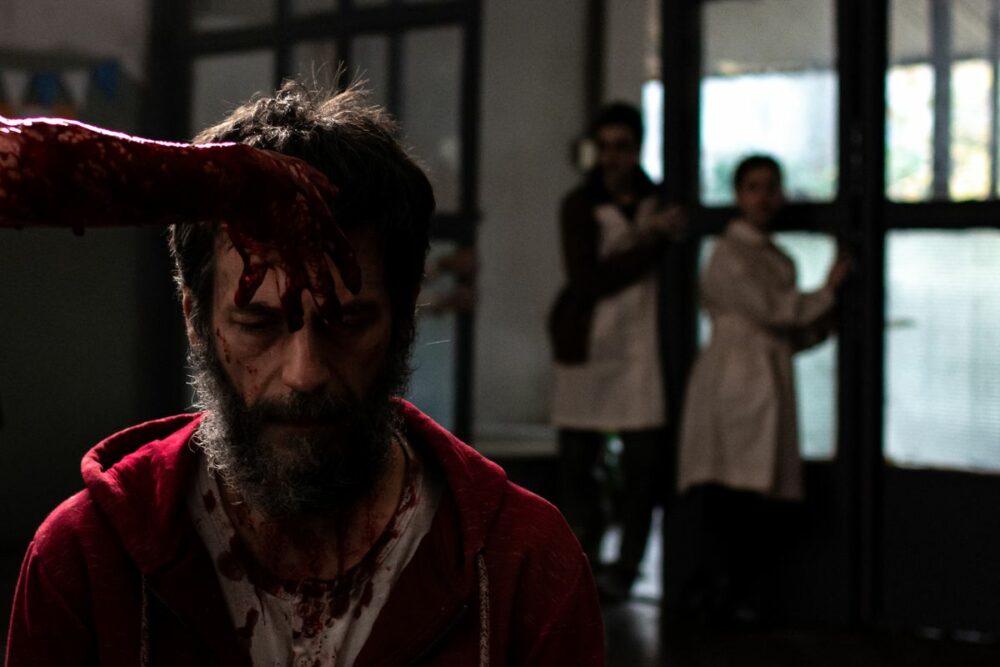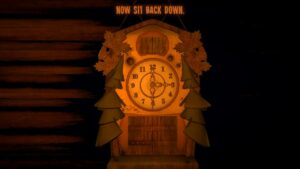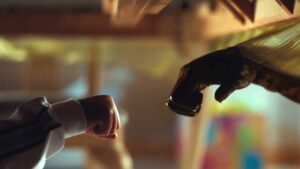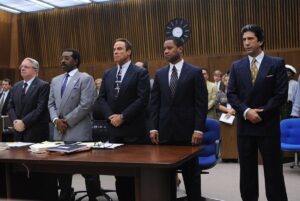Demián Rugna’s terrifying possession movie When Evil Lurks — now available for streaming on Shudder — breaks the rules of the subgenre in all sorts of startling ways. For one thing, it isn’t a religious movie at all, even though most exorcism movies are. For another, the victims facing down a demon in his film aren’t struggling with faith, or with something they don’t understand. They all know the rules for dealing with the hideous, bloated creatures that result from demon possession — the encarnado, or as the English subtitles put it, “the rotten.” There’s even a little teaching song about the rotten, presented in the film as something akin to a children’s lullaby.
So if everyone knows how to safely deal with demons, why is the movie so frightening? Because the rules — including “stay away from electricity and electrical appliances, demons can travel through them” and “only kill the possessed in certain specific ways” — take effort and self-control, and people are often greedy, lazy, or impulsive. “It’s too hard,” Rugna told Polygon at the 2023 Fantastic Fest in Austin, Texas. “You need to comply with the rules because the demon wants to be with you, but it’s too hard for us to run away from cities, trying to avoid electricity, to avoid even thinking about the devil.”
When Evil Lurks is a tremendously frightening movie, in part because it’s as much about the power we give our personal demons as it is about any sort of supernatural force. Unlike in films like The Exorcist and its many sequels and reboots, Rugna’s characters can’t expect any help from organized religion or from God. “I have no religion,” the director said. “And I hate religion as a business. I love religion as faith, or for helping people. But not as a business.” Instead, the characters in When Evil Lurks have to rely on each other, and on their own courage and discipline. That goes poorly, to put it mildly.
[embedded content]
They’re also meant to rely on institutions put in place to help them. At the beginning of the film, it becomes clear that the government has systems in place to handle the encarnado, and those systems have failed entirely because of bureaucratic indifference and laziness. Rugna’s inspiration for the movie explains a lot about where that theme came from: As he told the Fantastic Fest audience in a Q&A after the movie’s premiere, he got the idea for When Evil Lurks from a series of news stories about farm pesticides in his native Argentina causing widespread health issues.
“The owners of those lands contaminate those fields with glyphosate to kill bugs — pesticide,” he said at the Q&A. “There’s a lot of people who work in those fields, and they get cancer. You’d probably see a little kid with cancer, because they are workers. They didn’t say anything — or if they say something, nobody knows.” He suggests that corporate apathy about the workers’ health, and the way the issue occured “out in the middle of nothing,” where it’s easy for profiteers and city-dwellers to ignore the impact of their choices, started him thinking about the idea of lurking evils given free rein to spread.
“The pesticide infected them,” Rugna told Polygon. “Kids were born with cancer. Sometimes you see something in the news, but then there’s nothing more to say, and you forget the image. They’re in the middle of nothing, the middle of poverty. They must do work for less than a couple dollars, and they’re all ill. After you turn off the television, you forget, but they are still there, they are still probably gonna die.”
He said it happens too often, that “people who work the land” get “abandoned” by the system. “When I decided to make a movie with some kind of exorcism, I thought, OK, but what happens if the people cannot reach a priest? All the Exorcist movies happen in the city, in a big house. But what if we’re in the middle of nothing, in a poor house, with poor people who nobody cares for? Even the owner of the land wants to get rid of them, to burn their houses. It happens in my own country all the time — not the demons, [but the rest].”
All that said, while Rugna emphasizes how important realism in the acting, relationships, and setting was to him in making the movie, he laughs off the idea that realism in terms of reflecting the real world is important in horror. “You can see a movie just for fun,” he said. “Being entertaining is most important for me. If you have the chance to have reflection, that’s a double goal. But for me, it’s not fully necessary.”
He said the social inspirations just worked their way naturally into the writing because they’re part of his background. He didn’t set out to make a message movie, just one that would scare audiences. “I’ve noticed for myself in my movies, for a greater horror story, I want to make you suffer,” he said. “And the social element just comes along with my culture.”
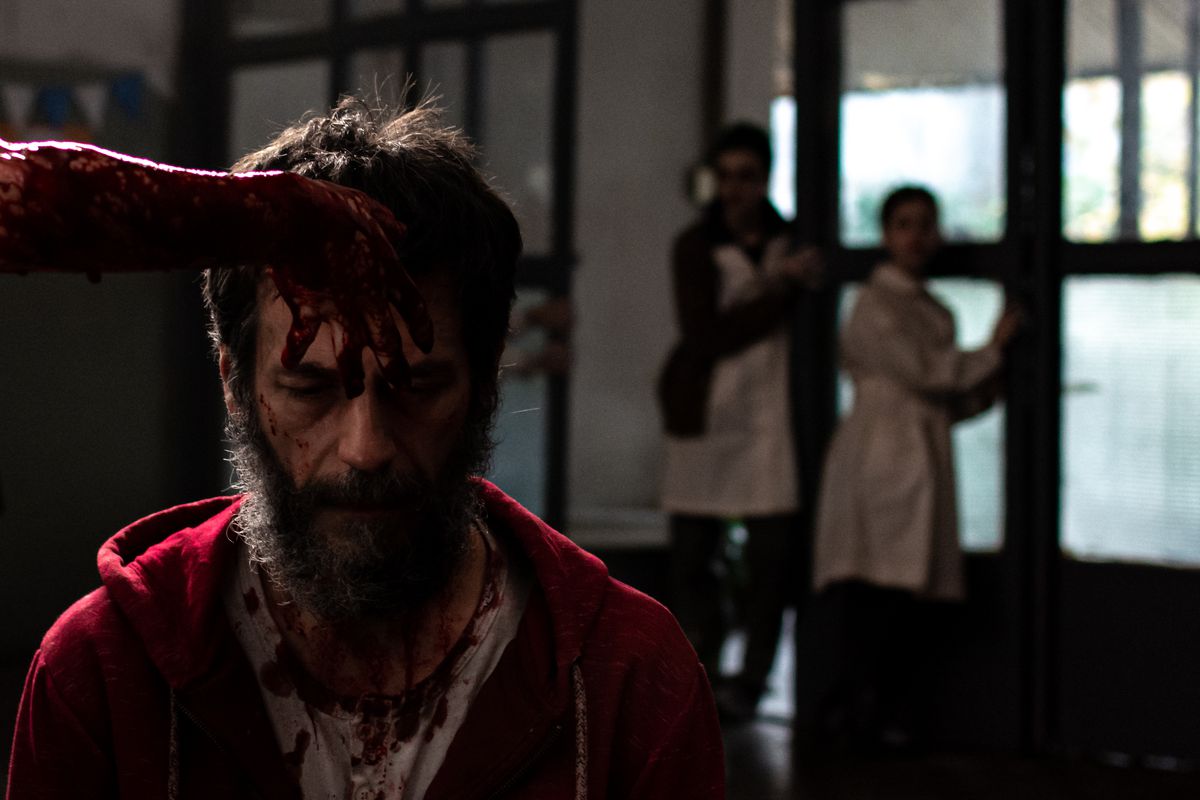
Ironically for a movie inspired by bureaucratic indifference to the suffering of children, though, one of the biggest limits on his film was bureaucratic regulations about how he could handle his child cast. When Evil Lurks is unusually brutal to its kid characters, with graphic scenes of child distress, mutilation, and death. In response to an audience question at the Q&A about how he protected the child actors, Rugna grinned and explained how his production walked the actors’ parents through their safety plans.
“I’d need two hours to tell about the process of working with the parents,” he said. “It’s too funny, because we did take care with the parents — we thought, OK, we want to share the entire script. We were scared about the reaction of the parents. […] The parents were too excited to put their kids in our movie. You can’t imagine. […] When the parents read the script, and we’re like, The kid’s gonna be bit by a dog and crushed with a car — ‘Oh, I love the script! Got it!’”
But the government was much more limiting, Rugna said. Among other things, in spite of the violence of the scenes involving children, they weren’t allowed to have artificial blood on the kids’ skin at any time. In another scene, a teenager wasn’t allowed to hold a gun during an emotional monologue. “All the time, it was horrible to work with the kids,” he said, laughing. “Not for the kids, for the rules.”
When Evil Lurks is streaming on Shudder now.
- SEO Powered Content & PR Distribution. Get Amplified Today.
- PlatoData.Network Vertical Generative Ai. Empower Yourself. Access Here.
- PlatoAiStream. Web3 Intelligence. Knowledge Amplified. Access Here.
- PlatoESG. Carbon, CleanTech, Energy, Environment, Solar, Waste Management. Access Here.
- PlatoHealth. Biotech and Clinical Trials Intelligence. Access Here.
- Source: https://www.polygon.com/23935228/when-evil-lurks-director-interview-demian-rugna-meaning
- 2023
- 50
- a
- About
- acting
- actors
- after
- Against
- All
- allowed
- along
- also
- among
- an
- and
- Another
- any
- Anything
- apathy
- ARE
- Argentina
- artificial
- as
- At
- audience
- audiences
- austin
- available
- avoid
- away
- background
- BE
- because
- becomes
- beginning
- behind
- BIG
- Biggest
- Bit
- blood
- born
- breaks
- bugs
- burn
- business
- but
- by
- came
- CAN
- cancer
- care
- causing
- certain
- chance
- characters
- child
- Children
- choices
- Cities
- City
- clear
- COM
- comes
- comply
- content
- corporate
- could
- country
- Couple
- CouRage
- creatures
- Culture
- deal
- dealing
- death
- decided
- devil
- DID
- die
- Director
- discipline
- distress
- do
- dog
- dollars
- doors
- double
- down
- During
- each
- easy
- effort
- electrical
- electricity
- element
- embedded
- Emotional
- emphasizes
- English
- entertaining
- entire
- entirely
- even
- everyone
- excited
- expect
- explained
- explains
- facing
- Failed
- faith
- fest
- Fields
- Figure
- figures
- Film
- films
- For
- force
- Free
- from
- fully
- fun
- funny
- Gaming
- Get
- give
- given
- Glass
- goal
- goes
- got
- Government
- graphic
- greater
- gun
- hand
- handle
- happen
- happens
- Hard
- has
- hate
- Have
- he
- head
- Health
- help
- helping
- him
- his
- hold
- Horror
- hours
- House
- houses
- How
- How To
- HTTPS
- i
- idea
- if
- ignore
- image
- imagine
- Impact
- important
- in
- Including
- Inspiration
- inspired
- instead
- institutions
- into
- involving
- Is
- issue
- IT
- ITS
- jpg
- just
- kids
- kind
- know
- knows
- Land
- lands
- less
- like
- limiting
- limits
- Little
- lot
- love
- make
- Making
- man
- me
- meant
- Message
- Middle
- more
- most
- mostly
- movie
- Movies
- much
- must
- my
- myself
- native
- necessary
- need
- news
- no
- not
- nothing
- now
- of
- off
- often
- on
- One
- or
- organized
- Other
- our
- out
- own
- owner
- owners
- parents
- part
- People
- personal
- place
- places
- plans
- plato
- plato data intelligence
- platodata
- platogaming
- Polygon
- poor
- possession
- Poverty
- power
- premiere
- presented
- probably
- Process
- Production
- protected
- put
- Q&A
- question
- reach
- reaction
- read
- Real
- real world
- really
- red
- reflecting
- reflection
- regulations
- Relationships
- religion
- rely
- response
- REST
- result
- rules
- Run
- safely
- Safety
- Said
- say
- says
- scared
- scene
- scenes
- script
- see
- sequels
- Series
- set
- setting
- Share
- Skin
- So
- Social
- some
- something
- sometimes
- Sometimes You
- song
- specific
- Sponsored
- spread
- staggering
- stand
- started
- still
- Stories
- Story
- streaming
- struggling
- suffering
- suggests
- supernatural
- system
- Systems
- Take
- Teaching
- teenager
- television
- tell
- terms
- texas
- than
- that
- The
- their
- Them
- theme
- then
- there
- they
- thing
- things
- Thinking
- those
- though
- thought
- Through
- time
- to
- told
- too
- Tor
- travel
- tremendously
- true
- trying
- turn
- two
- Understand
- unlike
- up
- us
- victims
- want
- wants
- was
- way
- ways
- we
- were
- What
- when
- where
- while
- WHO
- why
- widespread
- with
- Work
- worked
- workers
- working
- world
- would
- writing
- you
- youtube
- zephyrnet
